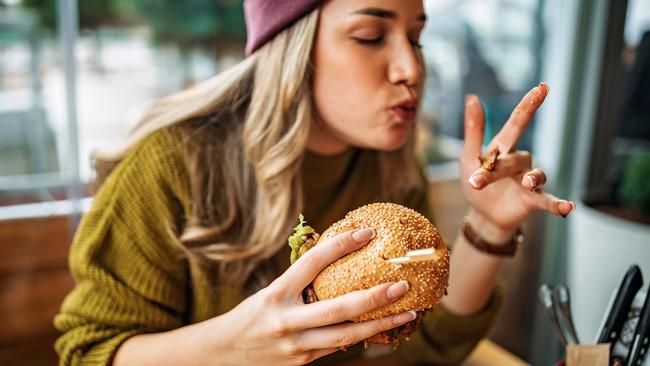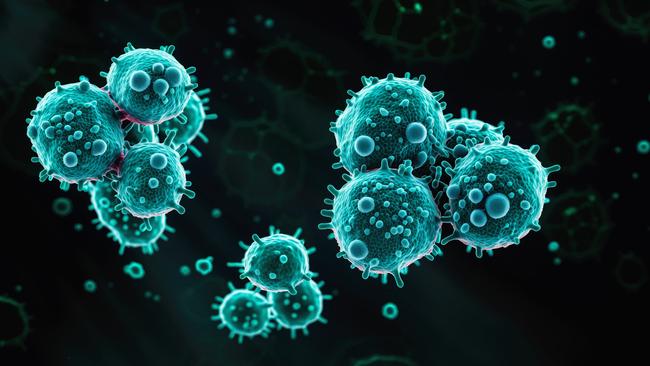‘Red flags’: Aussie doctor’s chilling junk food warning
An Australian doctor has issued an alarming warning about one of your all-time-favourite guilty pleasures.
Nutrition
Don't miss out on the headlines from Nutrition. Followed categories will be added to My News.
Welcome to Ask Doctor Zac, a weekly column from news.com.au. This week, Dr Zac Turner reveals the truth about junk food.
QUESTION: Hey Dr Zac – I’ve got a big question to ask. Can junk food cause cancer? I’ve just watched a video on Instagram by the guy who wants to live forever, Bryan Johnson. He says fast food companies design their food so they become addictive and the ingredients lead to lifelong diseases that can cause cancer. He even used to scare his kids when they were young by saying every time they drove past a fast food outlet, “look kids, that’s cancer.” Surely this can’t be true. I’d rather hear this from a doctor, not a tech billionaire trying to promote his new Netflix documentary. – Nathan, 23, Melbourne
ANSWER: Bryan Johnson, the tech billionaire intent on living forever, has a lot to say about the dangers of junk food. And as a doctor, I couldn’t help but lean in to hear his take – because, believe it or not, he’s onto something. Junk food isn’t just a guilty pleasure, it’s a carefully engineered product designed to make us want more, often at the expense of our health. But let’s unpack this with some medical insights to make it more relatable – and actionable.
Is junk food designed to be addictive?
Yes, there’s a reason you can’t stop at just one French fry or walk past a fast-food outlet without craving a burger.
Junk food is engineered to hit your brain’s “bliss point” – a combination of sugar, fat and salt that activates the brain’s reward system. This triggers a dopamine release, the same feel-good chemical linked to addictive behaviours.
Johnson isn’t exaggerating when he talks about food companies prioritising flavour and addictiveness over health. Studies have shown that ultra-processed foods can create dependency-like behaviours, especially in children, whose developing brains are particularly sensitive to dopamine spikes.
Withdrawal symptoms like irritability, fatigue and cravings are also real, making junk food seem eerily similar to other addictive substances.

Can junk food lead to cancer?
While junk food itself isn’t a direct cause of cancer, it plays a significant role in creating the conditions for it to develop.
Overnutrition, particularly from ultra-processed foods, is a key driver of obesity – a known risk factor for at least 13 types of cancer, including colorectal and breast cancer. Processed meats, another junk food staple, are classified as carcinogenic by the World Health Organisation. These foods often contain additives and compounds that can lead to cellular damage over time.
Moreover, diets high in sugar and unhealthy fats contribute to chronic inflammation, a precursor to cancer. So while that late-night binge on fries and nuggets might not immediately harm you, consistently eating junk food sets the stage for long-term health issues.
Signs to look out for
Your body will start showing signs when it’s had enough of junk food. Here are some red flags to watch out for:
● Rapid weight gain: This is one of the earliest and most noticeable signs of overnutrition.
● Skin changes: Acne, dull skin and even premature ageing are often linked to high sugar and fat intake.
● Fatigue: A diet lacking in essential nutrients can leave you feeling constantly tired.
● Digestive issues: Bloating, constipation or irregular bowel movements could indicate a lack of fibre.
● Mood swings: Junk food can disrupt blood sugar levels, leading to irritability and brain fog.

Breaking the junk food addiction cycle
If you or a loved one are experiencing any of these, it’s time to rethink your dependency on fast food.
For adults:
● Rewire your reward system: stock up on gut-friendly alternative snacks for the next time you’re craving highly processed junk food. These healthier snacks include nuts, fruits or dark chocolate. These options still satisfy cravings without the health risks.
The key though is to have as many things that are crunchy/raw as possible. I often say the crunchy things that start with C … carrots, celery, cucumber, cauliflower, cabbage, corn. You get the idea, and other letters are also allowed. The crunch is from insoluble fibre, which is a gift to your good gut bacteria.
● Plan ahead: Meal prepping can prevent those midweek fast-food runs.
● Hydrate: Often, we confuse thirst for hunger. Drinking water can curb cravings and improve overall health. Your skin will start glowing in no time.
● Consistency: If you keep this up, over time, you will break the cycle and your lifelong health will thank you for it.
For kids:
● Make healthy food fun: Turn fruits and vegetables into exciting shapes or colourful creations.
● Lead by example: Kids imitate adults. If you prioritise healthy eating, they’re likely to follow suit. On the flip side, if you normalise regular trips to fast food joints as a staple family meal, this habit will be normalised for the rest of their lives and be introduced to their children in the future.

● Limit exposure: Simply stop buying fast food at the supermarket and lining your pantry shelves with it. If it’s not in the house, it cannot be consumed by your kids.
While Bryan Johnson’s extreme approach to longevity might not resonate with everyone, his emphasis on avoiding junk food is firmly grounded in science and gets my full support.
The modern diet, heavy on ultra-processed foods, isn’t just a health risk – it’s a societal issue. And while not everyone has the resources to follow his hi-tech regimen, the principles he advocates, like avoiding junk food and prioritising nutrient-dense meals, are universally applicable.
So next time you’re tempted by fast food, ask yourself: is it worth it? Your body – and your future self – might just thank you for saying no.
Got a question? askdrzac@conciergedoctors.com.au
Follow Dr Zac on Instagram
Dr Zac Turner is a medical practitioner specialising in preventive health and wellness. He has four health/medical degrees – Bachelor of Medicine/Bachelor of Surgery at the University of Sydney, Bachelor of Nursing at Central Queensland University, and Bachelor of Biomedical Science at the University of the Sunshine Coast. He is a registrar for the Australian College of Rural and Remote Medicine, and is completing a PhD in Biomedical Engineering (UNSW). Dr Zac is the medical director for his own holistic wellness medical clinics throughout Australia, Concierge Doctors.
More Coverage
Originally published as ‘Red flags’: Aussie doctor’s chilling junk food warning





